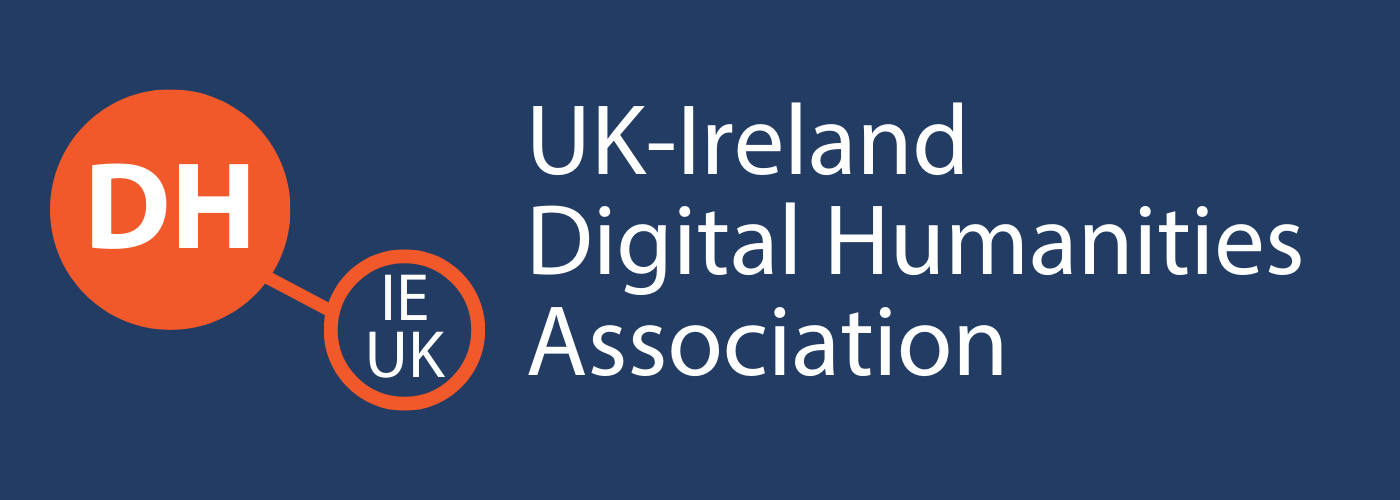Members' Briefing
2023-2024It has been another busy and exciting year for the UK-Ireland Digital Humanities Association. We are grateful to everyone who has contributed their time and expertise this year – whether by presenting at or attending the Annual Event, joining a community interest group, responding to surveys, or otherwise sharing your thoughts and ideas. The contributions of the community are essential to creating a sustainable, transparent, and representative organisation.
We remain committed to hearing from you about how we can improve or better serve digital humanities practitioners. If after reflecting on some of the milestones from the past year (and there’s plenty to celebrate, so please read on!), you have thoughts on how the Association might approach the coming year, we’d love to hear from you. Please let us know what you think.
We are also looking for people to help us put those thoughts into action. If you are interested in contributing to the work of the Association this year, please get in touch. We are particularly interested to have a few additional members join the organising committee for the 2025 Annual Event. If you’d like to get involved, please get in touch at uk-ie.digitalhumanities@sas.ac.uk.
Annual Event in Cork
The Association held its second annual event in Cork this June, generously hosted by the Department of Digital Humanities at UCC. Titled Inclusivity across Sectors / Uileghabhálacht Thar Earnálacha, this year’s event focused on putting values into practice across disciplinary and sectoral lines. Running across two days, the event saw 43 presentations, posters, workshops and panel discussions. We also ran our first pitch session, where presenters had five minutes to pitch a new idea, potential collaboration, or share an early-stage project they were working on. The first day of the event culminated in an engaging roundtable, where panellists from the creative and cultural sector, GLAM institutions, and local government discussed different approaches to inclusivity in their work.
We received more than double the number of submissions this year and 88 people attending; the energy at the event was a testament to the vibrancy of the community in Ireland and the UK. Look out for information about next year’s event, to be announced in early autumn.
We’ve collected the feedback and reflections from the event, which are available on our website.
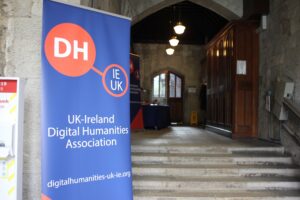
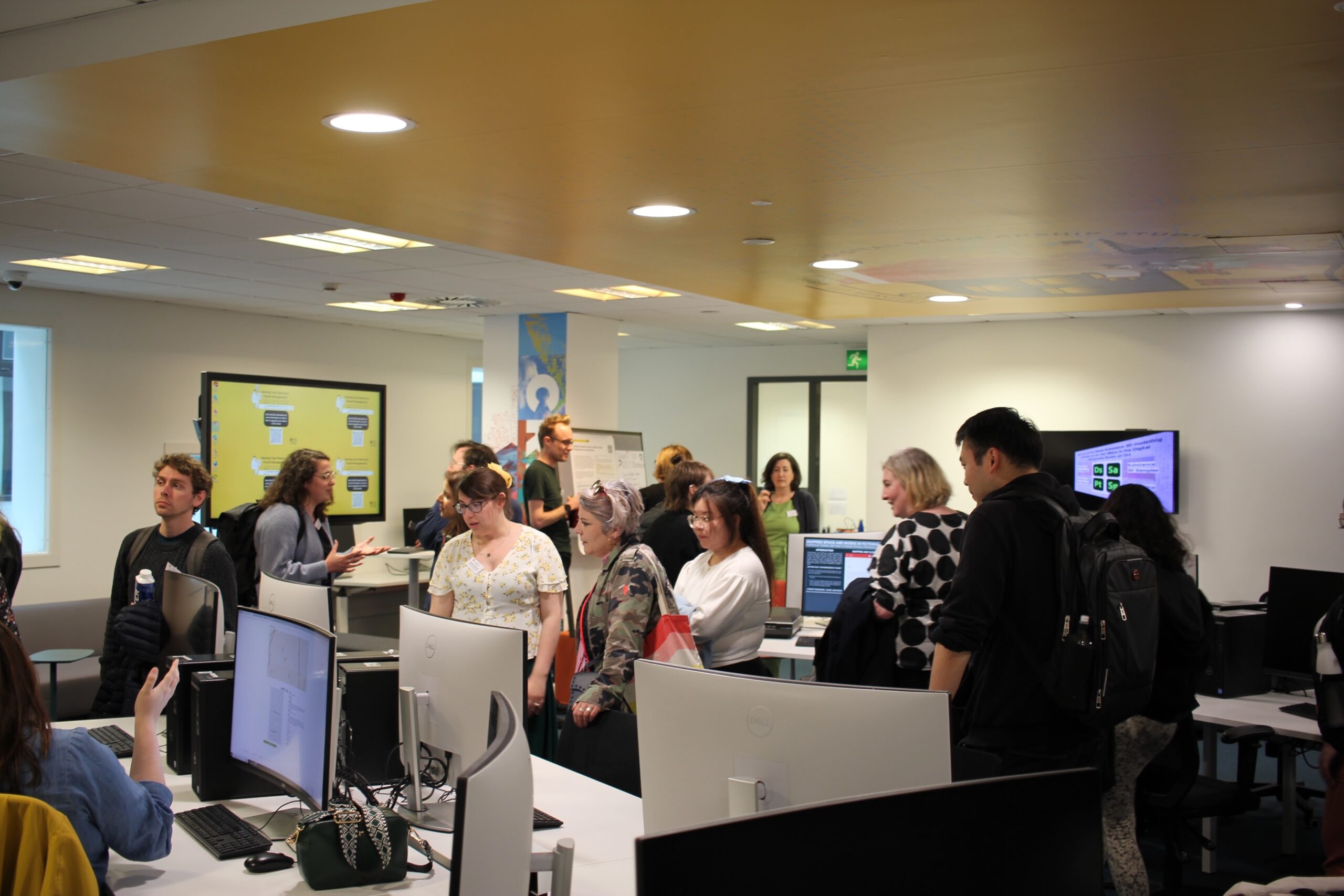
Governance Working Group
In January, we launched a Governance Working Group to begin developing the Association’s governance structures and membership scheme. Since kicking off, the group has been hard at work putting together proposals. They have been conducting desk research on other subject associations’ approach to governance and conducted a workshop at the Annual Event to gather feedback from attendees. The group will write up a formal set of proposals this autumn, which will be shared for final feedback and adoption – laying the groundwork for future elections and membership.
Community Interest Groups
Our five community interest groups, launched last year, have developed a rich series of programming and activities in the past months.
The Multilingual Digital Humanities in the UK and Ireland Community Interest Group organised an online workshop on Friday 24th November 2023 that aimed to discuss and develop recommendations for embedding multilingualism within and beyond the UK and Ireland’s Digital Humanities communities. The workshop included both open participation and invited contributions from DH researchers who have taken a leading role in furthering multilingual DH research locally and internationally. As a result of the workshop and wider reading, the CIG prepared a draft report that summarises the challenges and opportunities in relation to advancing multilingual DH work both within the UK and Ireland, and in collaboration with wider multilingual DH initiatives beyond the UK and Ireland. The final report will be published in September 2024 and will inform the future planned events and activities of the CIG.
Protecting the Investigator in Traumatic Research Areas has been focused on building its community this year through a series of online meetings. The group has also launched a new JISCmail list to better facilitate conversations within the group. Members of the group participated in a PhD workshop and conference on trauma in literary studies and presented on the CIG’s methods and goals at the DARIAH Annual Event in Lisbon. They have begun running a survey as part of the group’s anticipated outputs and look forward to sharing their results in the coming year.
Over the last year, the Digital Correspondence group has organised three online events that have brought together different expertise and viewpoints on digital correspondence, with a particular interest in the language of correspondence material. The events have been well attended, with the launch event attracting over 30 participants, and the other events having an audience of between 15-35 individuals from across the UK, Ireland, and elsewhere. The launch event in November saw three speakers from academia, GLAM and IT discuss their work and the opportunities for collaboration and intersectional interests between different groups and stakeholders. In April, the group held a roundtable on Ethics, Access and Sustainability that included five speakers discussing their experience of ethics in digital correspondence and communication materials, followed by Q&A from the panel and audience. And most recently in June, they hosted a summer event, What is this and why is it here?! Challenges and curiosities in correspondence, where six presenters discussed unusual and unexpected properties identified in correspondence archives, and their implications for methods, approach, and/or interpretation.
The Research Software Engineering in Arts and Humanities Community Interest Group over the last couple of months have been busy trying to get its first community survey off the ground. Their community survey will help map and better understand the community’s needs and to prioritise accordingly the CIG’s activities. In June, the group participated in the pitch session at the Annual Event in Cork and invited people to provide feedback and ideas on a draft of our survey. The survey will be soon live and the group is looking forward to hearing from you – stay tuned!
In their first year as a CIG, the Digital Humanities Climate Coalition has been very active. They have held monthly online community meetups that have been well attended by HE and GLAM colleagues across the UK and Ireland. These provide an open space to learn, share and discuss issues relevant to the DHCC. CIG members have delivered presentations at three events (UCD, Sheffield, SSI), and were asked to deliver a keynote on intersections between sustainability and open research at the University of Salford. The group have also led workshops based on the DHCC toolkit at the British Library and at the Association’s Annual Conference in Cork. This latter workshop focused on pedagogy and they hope to develop the ideas into teaching related content for the toolkit. Another key activity this year was the development and submission of a funding bid which, if successful, will enable the group to develop new features and content for the toolkit on the topic of responsible AI. Finally, with some support from the AHRC and the Design Museum Future Observatory, they have been developing an educational card game, based on the content of the tool kit. The game is currently in late prototype stage.
You can get involved in any of the groups by emailing the contact listed on the Community Interest Groups webpage.
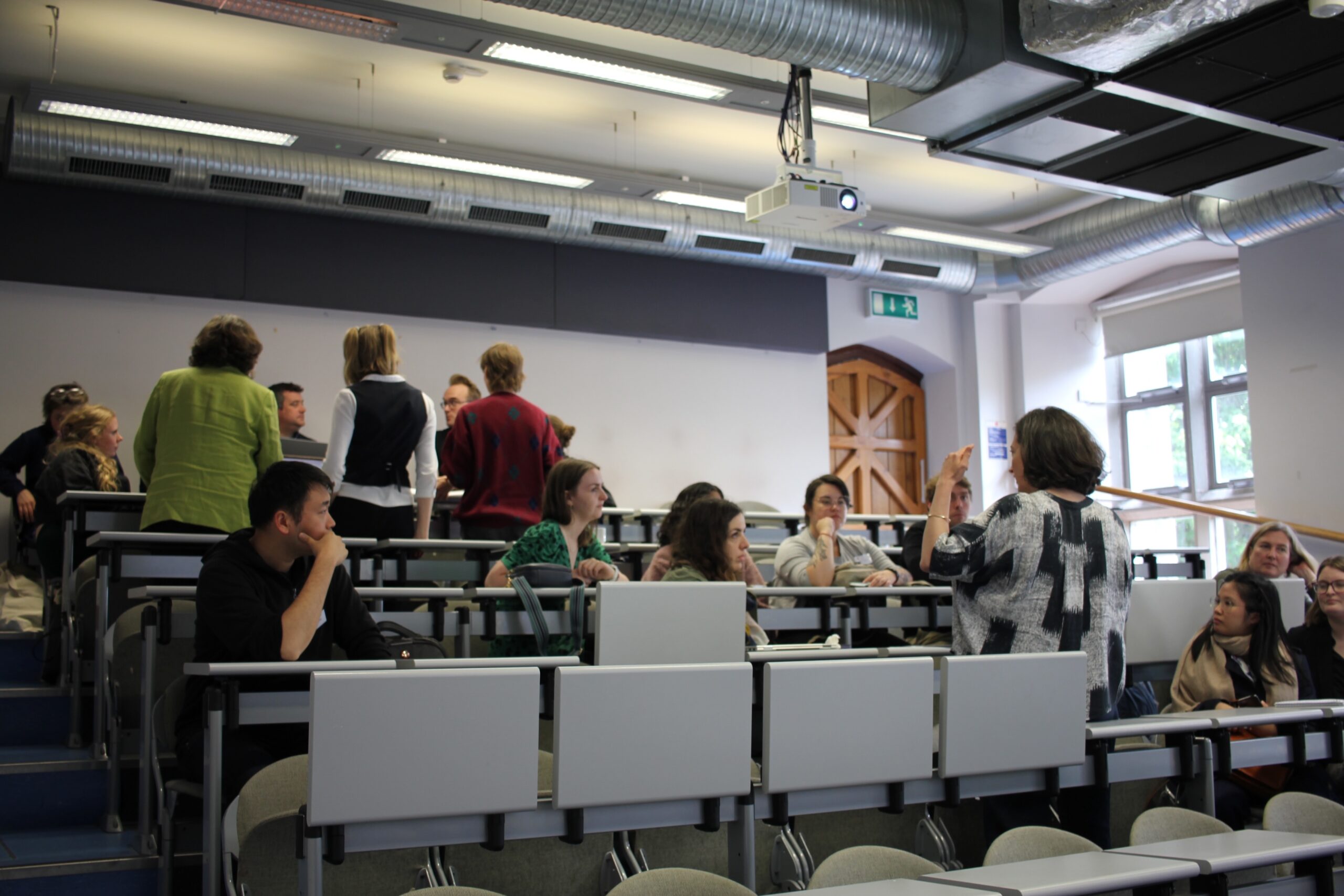
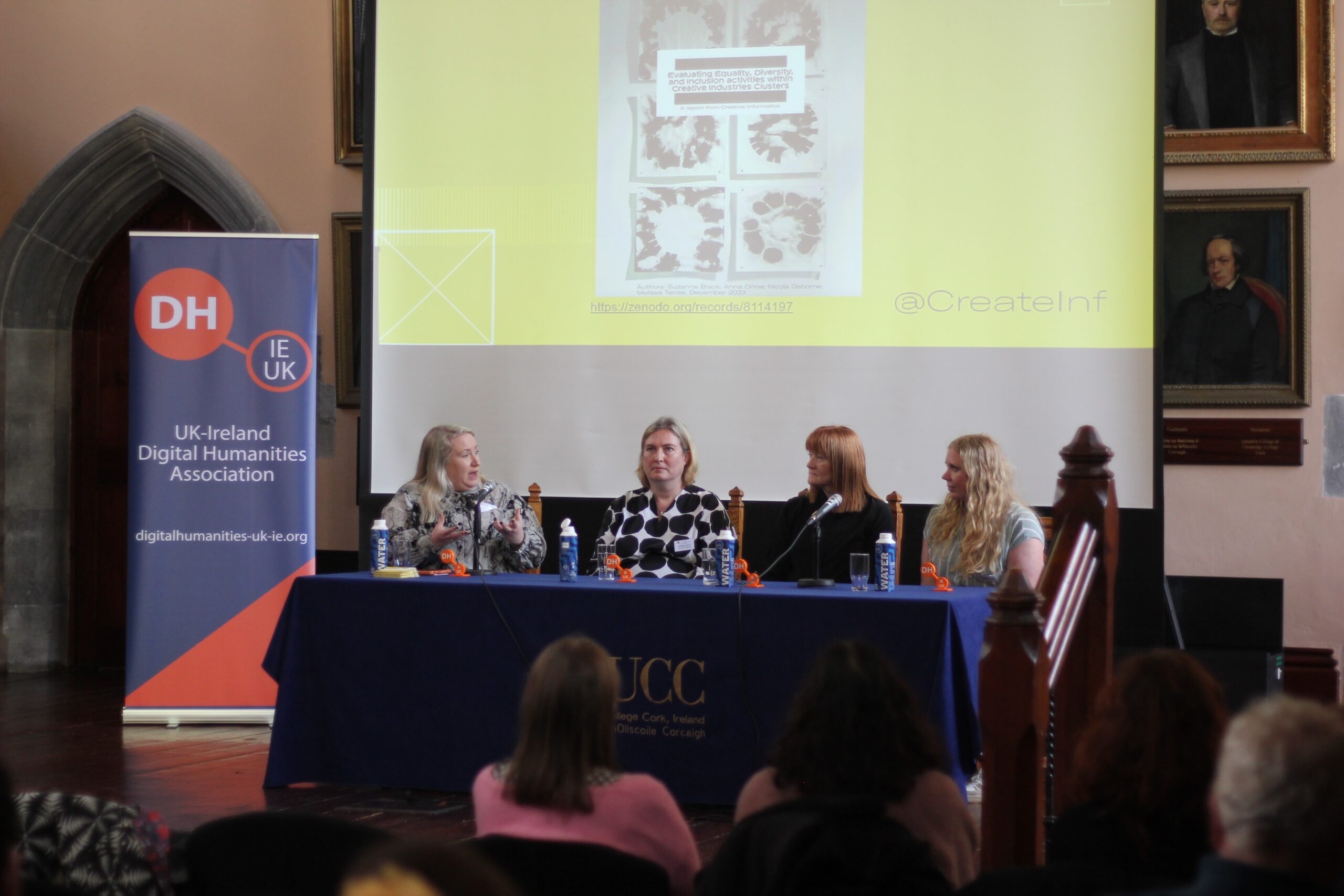
UK DARIAH Day and New Cooperating Partners
The Association is pleased to maintain strong connections with other national and international digital humanities organisations. In particular, it has continued to foster strong connections with DARIAH, the EU’s infrastructure to support digital research in the arts and humanities. This year has seen the recruitment of a new National Coordinator for Ireland, which will be announced in the autumn, as well as three new cooperating partners in the United Kingdom – the Universities of Brighton, Edinburgh and Leeds.
The UK partners will be holding a national DARIAH Day on 3 September at the University of Leeds.
New Members
The Association continues to grow and we’ve added 42 new members this year! These new members come from both Ireland and the UK, spanning higher education, publishing, the creative and cultural industries, and GLAM institutions. We’re excited to welcome these new members.
If you know someone who might be interested in joining the Association, please pass this email along.
Looking Forward
In the coming year, the Association will focus on governance and membership – building on the work of the Governance Working Group to begin implementing a sustainable strategy for managing the Association moving forward. We look forward to actively collaborating with members of the community to shape this work.
We also hope to continue building strong relationships with other digital humanities organisations, with partners in the cultural and creative industries, and with partners across the UK and Ireland. These activities will help shape the Association’s approach to advocacy and community engagement, ensuring that it can continue to develop as a voice for the discipline in national and international conversations.
Thank you for your active support and engagement, which continues to sit at the heart of what makes the Association such a lively community. We look forward to continued collaboration in the year to come.
